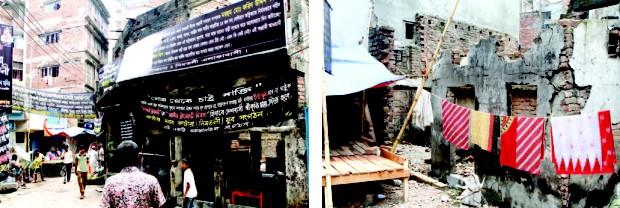| Home - Back Issues - The Team - Contact Us |
 |
| Volume 10 |Issue 23 | June 17, 2011 | |
|
|
Follow Up The Legacy of Nimtoli The devastating fire at Nimtoli on the night of June 3, 2010 has left permanent scars on hundreds of people. More importantly it has called for a permanent solution to prevent the repetition of such a nightmare. However, the solution remains a far cry even a year later. Tamanna Khan Walking past a number of stationary, confectionary and paper and plastic shops, Mohammad Mamun's three foot by four foot fruit shop at 33 Nimtoli can be reached. On the recently whitewashed walls signs of the devastating Nimtoli fire that killed at least 123 people a year ago including Mamun's seven-year-old son, Boishakh, are hard to find. Only the picture of Boishakh, hanging on the shop's wall, and the burn marks on Mamun's body remain as visible evidence of the fire. Life apparently has returned to normalcy for most residents of Nimtoli, but memories of the fire still haunt them. Five-year-old Sumaiya, who was at home with his seven-year-old brother, Sagar, on the night of the fire and received severe burns, still cringes with unknown fear and does not let her mother leave her side. "I had to shift my residence to another part of Nimtoli, as that nightmare haunted my daughter every moment," says Farida, who used to live right across the street from the six-storied building, from where the fire originated. "The re-construction work has been completed only four months back and all the flats are already rented out," informs Mohammad Selim indignantly, pointing to the coloured glass windows and grilled balconies of the building that carry no trace of the inferno. A probe report had shown that the fire broke out from the chemical godown, situated at the ground floor of the building, while food for a wedding ceremony was being cooked at the adjacent space. "The owner of the building should have known about the inflammable materials in the godown. How could he give permission to his tenants to cook food for the wedding at the ground floor that housed the godown?" accuses Selim, whose tailor shop, situated across the street, was burnt to ashes causing death of two of his workers.
However, Gulzar Khan, one of the three owners of the building says, "When I rented out the ground floor to the chemical godown, they told me that they would keep raw materials of plastic and papers. I did not know whether the materials were inflammable or not." In the old part of the town, it is very common to find residential building and business establishments of some sort on the same premises. The unplanned growth of this part of the city has made it difficult to define an area as either completely industrial or residential. To make matter worse, many of the shops and warehouses do not have approval from the appropriate authorities to set up shops or to store their goods in these areas. Even the Deputy Magistrate Rokon-Ud-Dowla from Rajuk had confirmed the Star that the warehouses and godowns in Nimtoli were illegal as they were not drawn out in the Rajuk plan. Unfortunately, the tracking down of these factories and warehouses remains a Herculean task. "In most areas of Old Dhaka you will find shops, factories or godowns of chemicals of some sorts. You would not even understand it from outside, but if you go inside you will find these establishments," says Abu Naser Khan, Chairman of Save the Environment Movement (PoBA). Brigadier General Abu Nayeem Mohammed Shahidullah, Director General, Bangladesh Fire Service and Civil Defence, reconfirms the claim saying that most of the industries in Old Dhaka need some sort of chemicals, be it a shoe or a plastic factory.
Moreover, many of the containers do not have the necessary information like name and content of the chemical and its hazards, written on the body of the container, informs Naser. "Even those who sell chemicals often do not know the rules for handling inflammable objects and are ignorant about the characteristics of the chemicals that they sell," says Naser. He suggests that there should be specific rules about the storage of chemicals and those who handle chemicals should have a minimum education. "They do not need to be highly educated but must have some training on the nature, usage and dangers of the chemicals," he adds. Executive member of PoBA, Nazimuddin, however, informs that businesses using chemicals have been asked to mark the containers as red for inflammable and yellow for non-inflammable content, as an immediate, temporary safety measure. According to the Fire Prevention and Fire Fighting Law 2003, Bangladesh Fire Service and Civil Defence is responsible for issuing licenses to factories and warehouses that use inflammable materials. "Before issuing or renewing a license, we ensure that all the safety conditions have been met," informs Nayeem. In the meantime, they also investigate complaints by local residents about the presence of an unwarranted chemical factory in a particular locality. However, both Nayeem and Naser complain that locals often refrain from reporting on an illegal warehouse, because often they themselves are the owners or landlords of these shops or godowns. "By law, mobile courts can conduct an investigation anywhere, anytime and track down such illegal establishments. However, we do not have our own magistrate and have to make requisition for a magistrate either from Deputy Commissioner's office, Dhaka or from the Rapid Action Battalion, which delays the process. Since they have their own commitments to handle, we have to wait for their magistrates," states Nayeem. However, Nayeem opines that sealing or closing factories and warehouses is not a long-term solution as he has seen that the sealed establishments often relocates illegally to a different part of city. "We soon realised that we were shifting the danger of one place to another," he asserts. As long term solutions, relocation of all chemical shops, factories and warehouses are being planned by the government. "A private social organisation has come up with the proposal to purchase 10 acres of land in Keraniganj and build a six-storied structure with 2 basement floors that can house 8,500 chemical warehouses and godowns," informs Nayeem. However, he has promised the organisation infrastructural support like fire safety, hydrant points, and roads only if they rent out or sell the shop spaces at prices verified by organisations like the Real Estate and Housing Association of Bangladesh (Rehab), so that the relocated chemical businesses do not lose out in any way. "Later at an inter-ministry meeting, it was decided that another government market needs to be built alongside this one," he adds. He hopes that work on the site will start from September. While relocation of hazardous industries from residential areas will prevent loss of life and property, punishment of persons responsible for such devastating accidents will create awareness among the public about illegal rent outs. After the Nimtoli incident, Gulzar had given the details of his tenant, Walid Hossain, the owner of the alleged chemical godown, to the investigation committee and a case was filed against the latter. Since Walid is still absconding, no one has been held responsible for the accident, thus only aggravating the grief of the victims. "I shall not get back my son, but I want to know who the owner of the godown was. One year has passed but we are yet to receive any justice," demands Mamun. On the other hand, Gulzar, who had lost eleven of his family members in the fire, now repents and requests everyone to be careful about renting out godowns in residential areas.
Copyright
(R) thedailystar.net 2011 |

